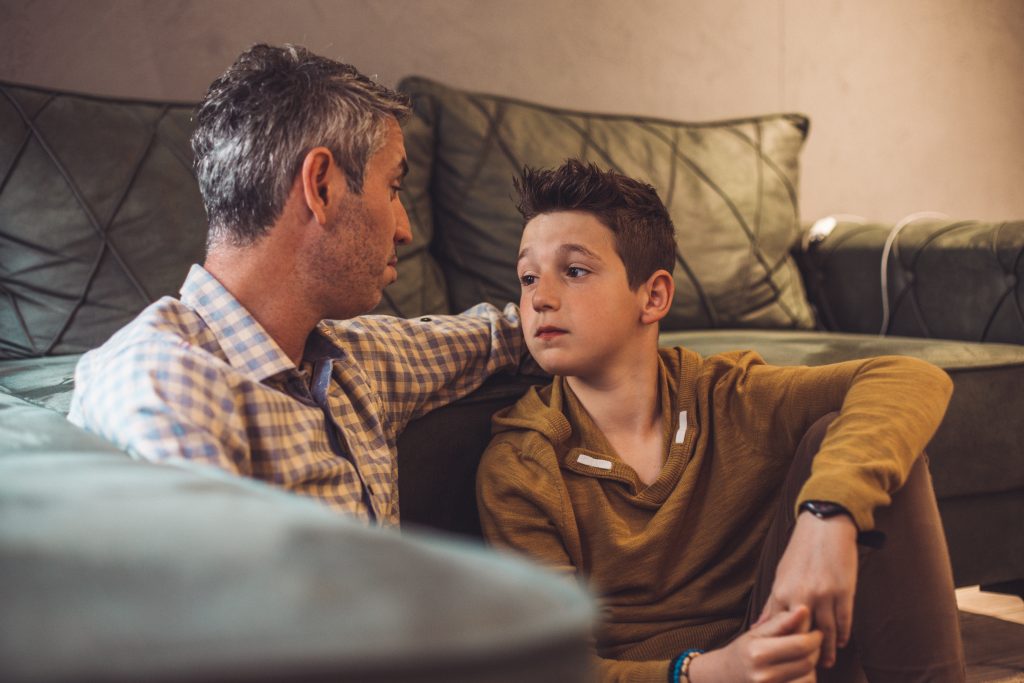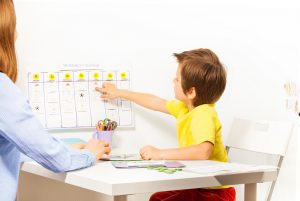Dads with ADHD: How to use your unique strengths to assist your kids
 As a father with ADHD, you know firsthand what your neurodivergent child or teen lives with every day. Because boys are more likely than girls to be hyperactive or impulsive, ADHD in boys is often displayed and diagnosed earlier and more often. But you may or may not have been assessed when you were growing up. And, although you have symptoms and traits of ADHD, you may still not have a formal diagnosis. Whether you’ve struggled personally or professionally with issues related to concentration, emotional regulation, organization, impulse control or productivity, you may find parenting particularly challenging. It can tough to be collaborative, stay curious and validate what’s going well when you wrestle with impatience, frustration and anxiety. Yet, there are many benefits that are unique to dads with ADHD.
As a father with ADHD, you know firsthand what your neurodivergent child or teen lives with every day. Because boys are more likely than girls to be hyperactive or impulsive, ADHD in boys is often displayed and diagnosed earlier and more often. But you may or may not have been assessed when you were growing up. And, although you have symptoms and traits of ADHD, you may still not have a formal diagnosis. Whether you’ve struggled personally or professionally with issues related to concentration, emotional regulation, organization, impulse control or productivity, you may find parenting particularly challenging. It can tough to be collaborative, stay curious and validate what’s going well when you wrestle with impatience, frustration and anxiety. Yet, there are many benefits that are unique to dads with ADHD.
Here are 5 ways that dads with ADHD can especially connect with their kids:
1. Dads with ADHD can hyperfocus on their kids.
 Having a parental figure who can zoom in and pay full attention on an activity is very useful for kids with and without ADHD. Dads who narrow their focus on doing something with their children can make them feel like they are the most important person in the world. This intense concentration facilitates meeting kids where they are, engaging in active listening, and working through small difficulties with precision. When you are hyperfocused, your ability to be an ally and your curiosity about your child opens doors to conversation and comforting support. Figure out some activities that you both enjoy, put down your phone and shine your spotlight of attention on your son or daughter.
Having a parental figure who can zoom in and pay full attention on an activity is very useful for kids with and without ADHD. Dads who narrow their focus on doing something with their children can make them feel like they are the most important person in the world. This intense concentration facilitates meeting kids where they are, engaging in active listening, and working through small difficulties with precision. When you are hyperfocused, your ability to be an ally and your curiosity about your child opens doors to conversation and comforting support. Figure out some activities that you both enjoy, put down your phone and shine your spotlight of attention on your son or daughter.
2. They help to normalize what makes children different.
 Men who have ADHD are learning to cope with their differences through structure, education, and a whole lot of patience. Dads with ADHD are doing this while raising kids who may share similar strengths and challenges. Hopefully, as an adult, you’ve reached a point where you value your uniquely wired brain and learned to live with it with compassion and pride. Watching their fathers learn to accept and appreciate their quirks in a healthy way can truly help children to develop more positive thoughts around what makes them different and special.
Men who have ADHD are learning to cope with their differences through structure, education, and a whole lot of patience. Dads with ADHD are doing this while raising kids who may share similar strengths and challenges. Hopefully, as an adult, you’ve reached a point where you value your uniquely wired brain and learned to live with it with compassion and pride. Watching their fathers learn to accept and appreciate their quirks in a healthy way can truly help children to develop more positive thoughts around what makes them different and special.
3. They can often better understand their children’s emotions.
All children experience frustration, anger, sadness and fear. During these moments, they may well lash out verbally or physically in aggressive ways. These big feelings can be confusing as well as overwhelming. Dads who live with ADHD may well understand those feelings differently than a neurotypical parent. Men with ADHD often struggle with anger management, intense shame and fear about not measuring up. Dads with ADHD have to go deal with these tougher emotions while supporting and guiding their kids towards developing self-regulation tools that are actually hard for them too. Consider joining with your son or daughter on some aspect of self-Control that you could both improve together. When you work collaboratively, you can model and share emotional intelligence and hard-earned coping strategies.
4. They are often natural problem solvers.
Dads with ADHD have experience learning about themselves and, if they’re diagnosed, what an ADHD diagnosis entails. Because of this, they have cultivated many tools to manage challenges. They have natural empathy and useful insights that can help with problem-solving. Our children want to feel heard and assisted with their troubles. However, they also need a good sounding board for their own ideas. Whether it’s working through math homework, trying to deal with a bully at school, or deciding what new sport to try, you can step up and be the confidante your son or daughter needs. Your support assists them to build resilience and confidence to figure out future issues as well.
5. They can help children develop healthy life strategies.
 When parents develop healthy coping mechanisms for the many challenges that life brings forth, they demonstrate how to engage in self-care. They also show how routines and relationships can bring meaning and satisfaction to life. Children, always watching and listening, will learn these tools and values from early on through adulthood. Parents with ADHD have a unique opportunity to lead by example while not expecting perfection from themselves. As a father with ADHD, you have a chance to help your kids dismantle gender stereotypes and that having strengths and vulnerabilities and asking for help are normal parts of being human.
When parents develop healthy coping mechanisms for the many challenges that life brings forth, they demonstrate how to engage in self-care. They also show how routines and relationships can bring meaning and satisfaction to life. Children, always watching and listening, will learn these tools and values from early on through adulthood. Parents with ADHD have a unique opportunity to lead by example while not expecting perfection from themselves. As a father with ADHD, you have a chance to help your kids dismantle gender stereotypes and that having strengths and vulnerabilities and asking for help are normal parts of being human.
Here are a few specific self-care areas that dads with ADHD can focus on:
-
-
-
Getting enough sleep.
Sleep deprivation is known to exacerbate ADHD symptoms. Your immune system’s ability to defend you from outside stressors is highly reliant on factors such as the amount of sleep you get on a regular basis. Without adequate sleep, it can be difficult to focus on simple tasks throughout the day. Sleep deprivation can also affect memory and reduce your problem-solving skills, which are already pain points with ADHD. Practice regular sleep and wake times and set up routines (with incentives if necessary) to facilitate this process.
-
Keeping a family planner or calendar.
Many parents use a calendar, planner, or to-do list to stay on top of everyday tasks. Dads with ADHD often integrate planning functions in their daily work life so why not apply this skill at home? Use a whiteboard, Post-it notes on a wall calendar or a chalkboard to set up daily and weekly routines. This helps kids see what’s coming and learn how to organize themselves accordingly. When you rely on this and encourage them to do the same, they will improve their own planning and prioritizing skills.
-
Seeking outside support.
If you don’t know how to do something at work or at home, you’ll probably seek assistance, perhaps online or in person. Kids with ADHD often expect themselves to be able to do things on their own. They also set unrealistically high standards for themselves. Show your child or teen that it’s important to ask for help when you need it. Whether it’s managing learning issues, ADHD or mental health challenges, find support in your community for your youngster and for yourself. This could take the form of reading books. It might mean finding family or individual counseling or coaching, or consulting with a physician about medications. Talking to educators or other parents at school or taking a parenting class can also be helpful.
-
Engaging in regular physical exercise.
Have you ever seen a dad running at 7:30 am, pushing a stroller, and holding a dog’s leash? How about hitting the gym right after work for 20-30 minutes to get their heart rate up before heading home? Many dads who struggle with ADHD develop a regular exercise routine. This helps regulate their emotions and clear their minds. Dads will often work their exercise in with their kids, too. Evening hoops in the driveway, playing catch, and early morning stretches are ways to bond with kids and get some mental clarity.
-
-
What you need to remember, regardless of your circumstance, is that you are the best father for your child/children. You have helped to bring them into the world, you have nurtured them, and you have loved them to the best of your ability and within your personal resources. It’s time to start valuing your unique self and the meaningful connections you have with your children. 
Learn more:
